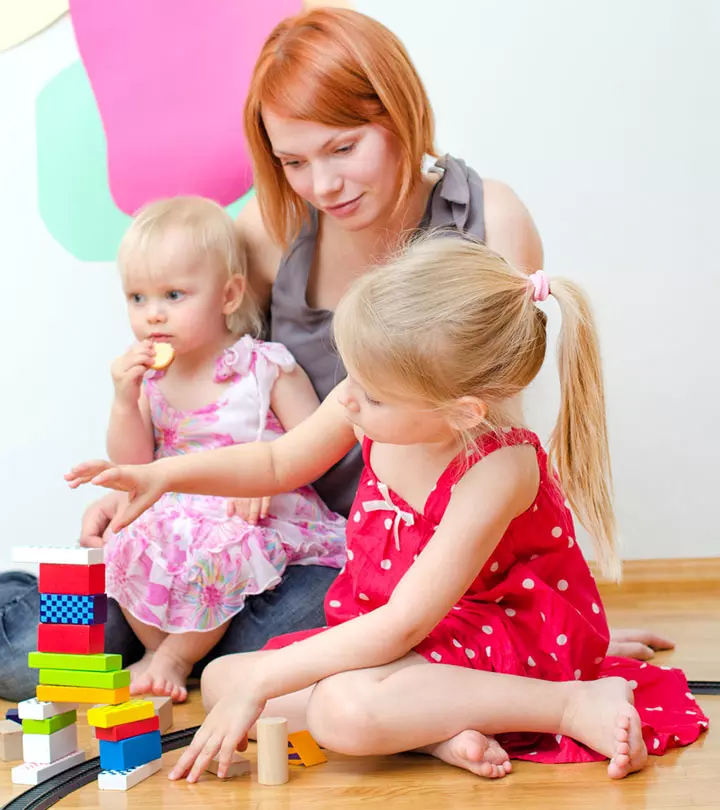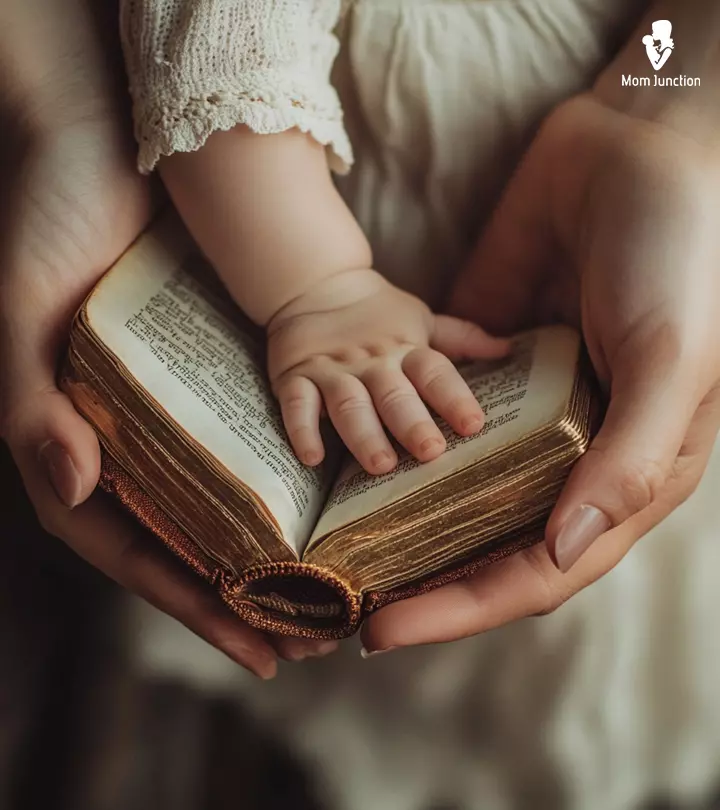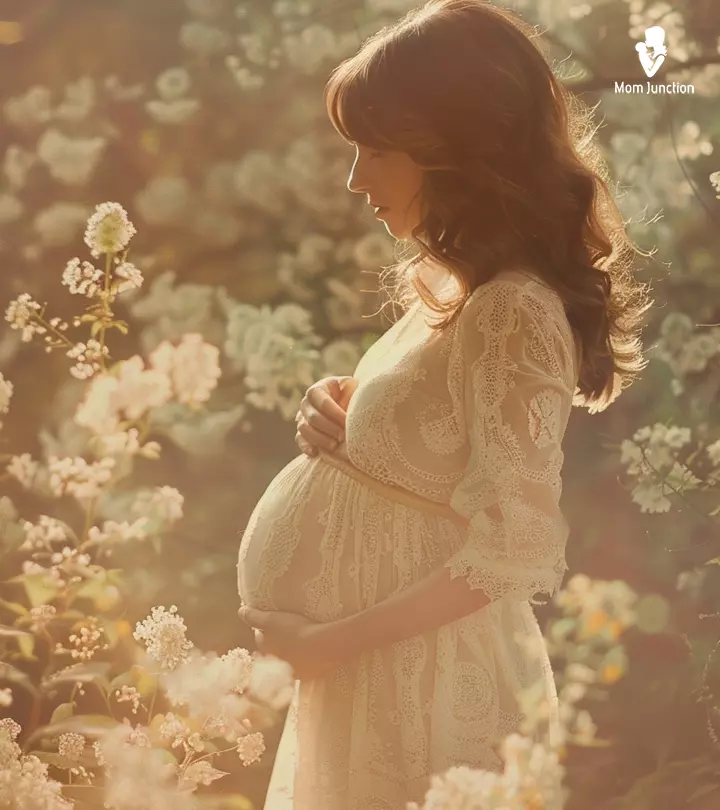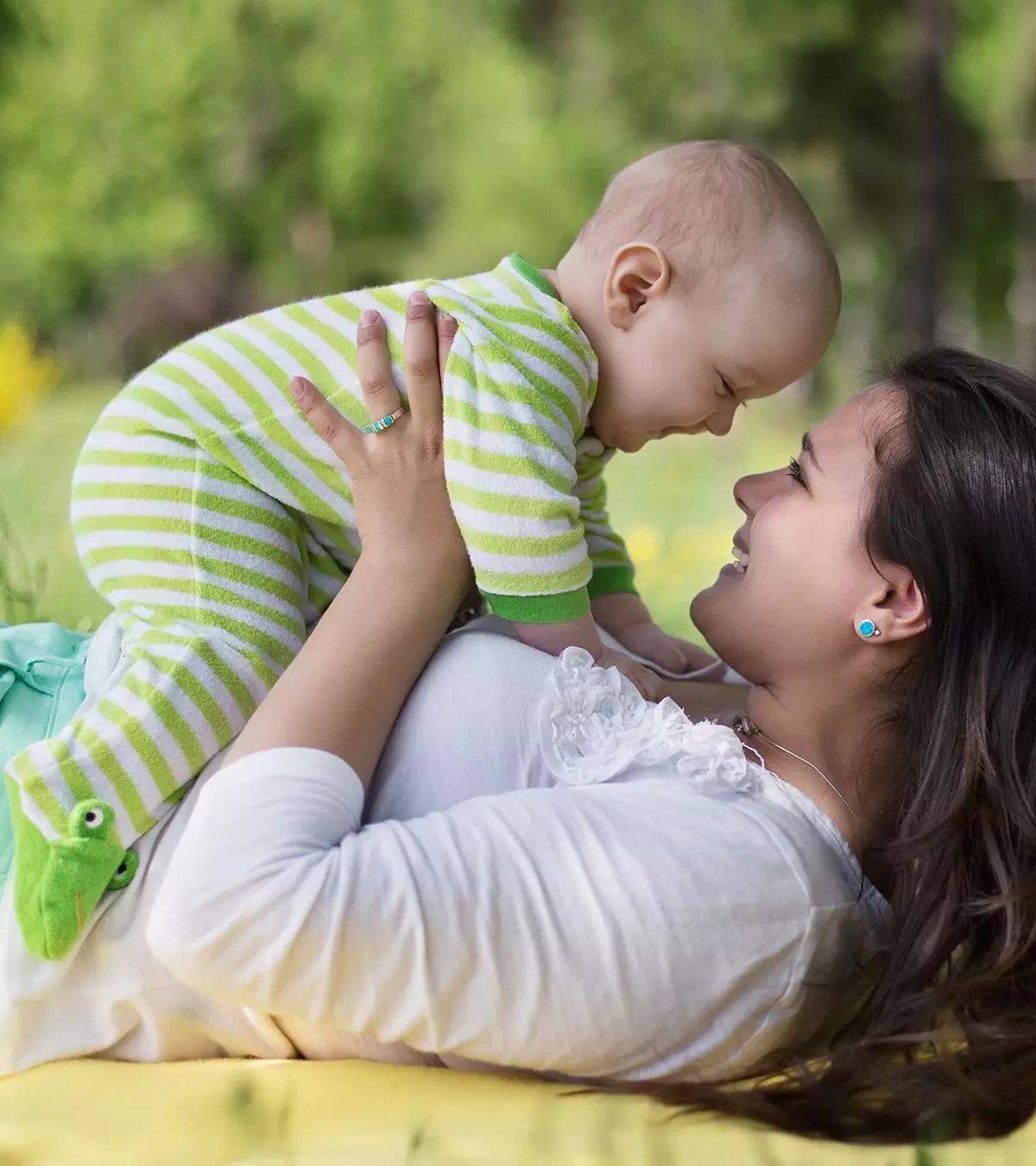
Image: iStock
Have you heard about the oldest child syndrome? According to Alfred Adler’s Birth Order Theory, one’s personality and who one becomes as an individual is influenced by the order they come in the family (1). Although the theory has been challenged repeatedly, a few characteristics stated for oldest, middle, and youngest children remain consistent, and oldest child syndrome is one characteristic that is usually spoken about.

The birth order, family’s situation, a combination of these, and other factors play a major role in shaping the child’s personality and its development. Read this post to understand about oldest child syndrome.
Key Pointers
- Obsession, desire for perfection, high self-esteem, or pressure to meet parents’ expectations are common signs of oldest child syndrome.
- Children with oldest child syndrome could show dominance and act as second parents to siblings.
- You can help the child overcome it by not expecting much from them, paying special attention, and spending time with them.
What Is Oldest Child Syndrome?

Have you noticed your oldest child getting unexpectedly competitive with their younger sibling or throwing a tantrum out of jealousy? Do they show dominance or boss around their younger siblings? These may be signs of oldest child syndrome in your firstborn.
With most firstborns across the world, the birth of their sibling brings a normal transition in their lives. From being the “only child” of their parents, they are now dethroned and have to share their parent’s love and attention with their younger siblings. This transition can be stressful and may cause a developmental crisis for many children (2). It could be the root cause of sibling rivalry, jealousy and a traumatic experience for the firstborns (1).
Though there are pros and cons of being the oldest child, certain behaviors and personality characteristics can give rise to the oldest child syndrome.
Impact of Oldest Child Syndrome On Mental Health
Oldest child syndrome can have a notable impact on mental health. Studies show that the pressures of added responsibility and high expectations placed on the oldest child can contribute to feelings of stress, anxiety, and even depression. Recognizing these potential issues is essential for parents to offer the right support (3).
8 Characteristics Or Signs Of Oldest Child Syndrome
The oldest child in a family experiences some emotions. While some of these characteristics are good, a few characteristics may not be healthy for their personality.
1. They might want to lead and dominate

Firstborn children are thrust into a leadership position when their younger siblings arrive. Leading and helping their younger siblings and showing maturity become a part of their identity (4). But if they become dominating instead of leading, it becomes a sign of the oldest child syndrome. These traits can make it challenging to build and sustain friendships, as a desire for control or perfection might distance peers and hinder social connections. For example, the firstborns might insist on deciding the rules of a game or may want to be the ones who assign tasks to other siblings.
 Trivia
Trivia2. They might have a constant urge to be perfect
A study conducted in 2008 states that the firstborns tend to be perfectionists and have higher standards (5).
They can also be called ‘achievers.’ It is fine until they know their limits. If they become aggressive or depressed when they cannot achieve success or when their sibling wins, it becomes an unhealthy trait. For example, if the elder child gets lower marks than the younger one, they might feel disappointed and study harder to satisfy their parents.
3. They might have the pressure of parent’s expectations
In a conversation with a blog post, Jamila Jones, a licensed clinical professional counselor (LCPC) and founder and executive director of Reclaiming Minds Therapy and Wellness Clinic says, “As the firstborn daughter, these children are often expected to set an example for their younger siblings, taking on more responsibilities and acting as role models” (6). These expectations are common for all firstborns, irrespective of their gender. Due to their constant urge to be perfect and their tendency to please their parents, older children have greater academic pressure than their younger siblings. Also, parents expect their oldest children to be a role models for their younger siblings in every aspect, including academics (7). The pressure from the parents and the need to excel and gain constant recognition could take them into a zone where they cannot accept failure, which could become problematic in their later years. It can be commonly seen in many households that parents often put pressure on their firstborns to be the best in everything and set an example for their younger siblings.
4. They may have high self-esteem
According to Adler’s theory and multiple studies in recent times, it has been found that older children tend to have higher self-esteem and confidence (8).
It helps them in their academic performance and professionalism but may not be helpful in social life. High self-esteem could also lead to ego problems and resentment, and if they are not humble and do not have gratitude, others might not accept them. For example, firstborns may feel pride in teaching something to their younger siblings, but they might feel disappointed when they can’t take charge with friends or peers.
 Expert says
Expert says5. They might develop an unhealthy competitive attitude

When sibling rivalry and jealousy on the sibling’s arrival are not handled properly by parents, the firstborn can hold it as a grudge against their parents or their younger sibling. The elder ones can perceive the younger sibling as a resource contender or nuisance instead of a playmate in this scenario (9). This creates unhealthy competition between the siblings even after growing up—a sign of the oldest child syndrome. For example- if the younger child outperforms the firstborn, the firstborn may go out of their way to regain the ‘best child’ title.
6. They might become obsessive
The oldest child becomes a protector of the younger ones. It is a good quality until it turns extreme, and they start to exercise authority over them.
If you find your child going overboard trying to make something perfect to the level of obsession, it is unhealthy for them and the younger siblings. Even the younger children may get used to the protection and become dependent, while the oldest ones could lose themselves to their siblings and become obsessive. This obsession is also more visible in mixed dyads. For example, firstborn brothers are comparatively more protective of their younger sisters than younger brothers, similarly, firstborn sisters are more protective of their younger brothers (10).
7. They may act as a second-parent to their siblings
When parents have their second child, they encourage their firstborns to care for their younger siblings. Often, this parenting strategy can give rise to a sibling bond where the firstborn becomes a second-parent figure to the younger sibling (10). Some oldest children may develop parental feelings and responsibility towards their younger siblings, evident in their personalities and behavior. It goes smooth until the attachment is within boundaries. Otherwise, it could be harmful to both. They might expect the younger sibling to start obeying them like they obey their parents.
Maya Yasi, the oldest daughter to her parents, shares her experience of the oldest child syndrome. She writes, “Since I was raised by a single mother I’ve acted as a second parent to my brother, who frequently asks why I’m acting like mom. My father could not stay organized even if his life counted on it, so I was the one who was constantly asked to do things. From directions to practice to making sure we ate, it was my responsibility. I had to nag my brother and father for anything to get done. Naturally, I struggled with my mom since I still tried to be the parent when there was already someone to fill that role. So I got used to filling it only when she had to work (i).”
8. They might become controlling
In their quest for perfection and achievements, firstborn children may develop a tendency to control everything around them, including their younger siblings. Their inherent tendency to lead and the power to act as a second-parent to their younger siblings can be the reason why some oldest children become overly controlling (11). For example, an elder sibling might want to be informed about their younger siblings’ whereabouts even if the younger ones have already informed their parents.
 Quick fact
Quick factHow Can the Oldest Child Overcome This Syndrome?
Dr. Howard Pratt, DO, behavioral health medical director at Community Health of South Florida, Inc., says, “It’s important not to put a label on a child. If you are going to have a firstborn seen by a mental health professional, it’s important to go in without preconceptions that this child will have all of these symptoms just because they were born first.”
If you notice your oldest child demonstrating some characteristics of oldest child syndrome, here are some ways by which you can help them overcome (11).
- Have moderate expectations from firstborn
Intentionally or unintentionally, the explosion of expectations from firstborns can put a huge amount of pressure on them. If your firstborn shows traits of being a people-pleaser, they might also feel extremely bad or miserable when they fail.
Though this characteristic develops from a firstborn’s tendency for perfectionism, you must encourage and praise them even when they fail. Allow them to fail at times and teach them how to accept this failure gracefully.
- Provide ample opportunities

Most parents expect their first child to be more of a role model for their younger siblings, but little do they realize the number of responsibilities they are putting on them.
Do not overburden your firstborn with responsibilities, instead provide them ample opportunities to grow. At the same time, it is okay to encourage them to develop leadership skills, value independence, and teach them not to become too bossy or dominating.
- Spend time with them alone
Irrespective of the number of children you have, make time for each child. The oldest children must be spoken to in a casual and friendly way. You can take an interest in their friends, school work, classmates, share memories of your childhood, and speak to them about their plans.
Doing so gives them a sense of confidence and trust and makes them realize that despite their younger siblings, their parents love them equally.
- Provide special privileges to them

One of the many situations that the oldest children face is a more-focused upbringing because first-time parents put all their attention towards this child. This might make their upbringing tough after the arrival of their siblings. Explaining the birth order theory in a podcast, Dr. Kate Eshleman, PsyD, a pediatric psychologist at the Cleveland Clinic states, “When we think about parents and they have their first children, parents are more anxious, they want to do things right, they probably inherently have more time on their hands to focus on the first child. They’re younger by nature, too. So there’s a lot of things that are happening when a first child is born versus when any subsequent children are born” (12).
To balance this out, you must give your eldest child some special privileges, such as late bedtime, longer playtime after school, and having a say in a few discussions. Set some family rules for all your children and give some special privileges to each of your children. This evens out any biases that your children might have in their minds.
- Reduce the caregiver burden
It becomes normal for parents to let their firstborn children take care of their siblings. However, as parents, you must ensure that you are overburdening them with responsibilities. Remember that they are also just child, so, let them ‘be kids’ and not mini-parents. If you wish, you can give some age-appropriate caregiving duties to your firstborn, like ‘Do not let your siblings run around’.
- Resolve siblings’ conflicts unbiasedly
When siblings fight, parents often use phrases like ‘You are older, you should be more understanding’ or reserve to hit the elder sibling to set an example for the other siblings. However, this can lead to resentment and jealousy in firstborn. Therefore, make sure to listen to the whole story before driving to any conclusion and give unbiased opinions.
Frequently Asked Questions
1. How does being the oldest child affect personality?
The oldest child in a family is usually under more pressure, making them more anxious and serious. Parents usually look up to them to take care of their younger siblings, making them more responsible. When the second child is born, parents’ attention shifts to them, making the oldest child independent.
Dr. Pratt observes, “Birth order is not a great determinant of personality. The family dynamics at the time of birth and after that are more likely to affect a child’s personality. The environment in which the child grows up allows them to develop and define their personality.”
2. Are oldest children more attractive?
The birth order may not determine the attractiveness of a child. However, the older child can be more serious and responsible. The younger children, on the other hand, tend to be carefree and more relaxed. Nonetheless, it cannot be generalized, and every child has unique personality traits.
3. Are there any gender differences in how the oldest child syndrome manifests?
No proven data shows unique gender differences in how the oldest child syndrome appears. However, there may be some gender differences in how it manifests based mainly on societal expectations and cultural norms, which can vary across different cultures and periods. For instance, the oldest daughters may be expected to assume caregiving roles like caring for younger siblings. In contrast, the oldest sons may be expected to take leadership roles in the family and be role models for younger siblings.
4. Is oldest child syndrome recognized by psychologists and other experts?
Oldest child syndrome is not a recognized diagnostic term in psychology. However, psychologists and other experts agree that birth order may impact personality traits and behaviors (5).
5. How does the oldest child syndrome affect romantic relationships and family dynamics?
Research indicates that individuals with the oldest child syndrome are more inclined to form close bonds with others who share their birth order. Additionally, firstborns tend to display a greater sense of responsibility, which is integral to a relationship. Furthermore, oldest children often develop nurturing qualities due to their role in caring for younger siblings. Therefore, they may exhibit caregiving behaviors and prioritize the needs of their partners. However, if the oldest child becomes overly focused on caretaking and neglects their own needs, it may also lead to potential imbalances in the relationship (13) (14).
6. How can parents support their oldest child in managing expectations?
Parents can help by promoting a balanced view of success and setbacks, and encouraging their oldest child to explore interests beyond their responsibilities. Open conversations about feelings and expectations can reduce stress and create a more supportive atmosphere.
Oldest child syndrome comprises the behavioral changes exhibited by your firstborn after the birth of their younger sibling. They may show dominating tendencies, develop an unhealthy competitive attitude, and become controlling. However, these changes in their behavior and emotions are natural and experienced by most older siblings. Try the tips mentioned here to help your child overcome their insecurities. Further, spend whatever spare time you have with them, and ensure you give them your undivided attention. If you feel you are unable to help your child, you could seek help from professionals.
Infographic: Common Myths About Oldest Children
Often the oldest children of a family are stereotyped for harboring certain behavioral and personality traits. Some of the most common misconceptions about the oldest children in a family are depicted in this infographic.
Some thing wrong with infographic shortcode. please verify shortcode syntax
Illustration: Signs Of Oldest Child Syndrome And How To Deal With It

Image: Stable Diffusion/MomJunction Design Team
If you have more than one child in your family you may wonder what an Old Child Syndrome is. Watch this informative video to learn about Oldest Child Syndrome and how it can affect your child’s behavior.
Personal Experience: Source
MomJunction articles include first-hand experiences to provide you with better insights through real-life narratives. Here are the sources of personal accounts referenced in this article.
i. The Psychology of Being an Oldest Daughter.https://medium.com/@papayamaya04/the-psychology-of-being-an-oldest-daughter-4f87cbb26839
References
- Julia Badger and Peter Reddy; The effects of birth order on personality traits and feelings of academic sibling rivalry.
https://files.eric.ed.gov/fulltext/EJ860620.pdf - Brenda L. Volling; Family Transitions Following the Birth of a Sibling: An Empirical Review of Changes in the Firstborn’s Adjustment.
https://files.eric.ed.gov/fulltext/EJ860620.pdf - Fukuya, Yoshifumi, et al.; Association of Birth Order With Mental Health Problems, Self-Esteem, Resilience, and Happiness Among Children: Results From A-CHILD Study.
https://pmc.ncbi.nlm.nih.gov/articles/PMC8079750/ - Why firstborns are more likely to become leaders.
https://www.weforum.org/stories/2015/07/why-firstborns-are-more-likely-to-become-leaders/ - How Birth Order Impacts Personality.
https://online.jwu.edu/blog/how-birth-order-impacts-your-personality/ - What is Eldest Daughter Syndrome?
https://www.charliehealth.com/post/eldest-daughter-syndrome - Alissa Jo Combs-Draughn; The impact of psychological birth order on academic achievement and motivation.
https://scholarworks.waldenu.edu/cgi/viewcontent.cgi?article=3632&context=dissertations - Dotto Nhandi; Siblings’ Birth Order Interaction and Self-esteem Development: Forgotten Social Setting for e-Health Delivery in Tanzania?
https://www.ijern.com/journal/2017/January-2017/05.pdf - Guoying Qian et al.; (2025); The relationship between parental role expectations and sibling jealousy: the mediating effect of first-born children’s role cognition.
https://pmc.ncbi.nlm.nih.gov/articles/PMC9992901/ - Shawn D Whiteman et al.; (2012); Theoretical Perspectives on Sibling Relationships.
https://pmc.ncbi.nlm.nih.gov/articles/PMC3127252/ - Tips for Parenting Firstborn Children.
https://www.physicianscenter.org/parents/parenting-resources/articles/tips-parenting-firstborn-children/ - Does Birth Order Dictate Personality? with Kate Eshleman, PsyD
https://my.clevelandclinic.org/podcasts/health-essentials/does-birth-order-dictate-personality - Salmon Catherine; Birth Order and Relationships
https://idp.springer.com/authorize?response_type=cookie&client_id=springerlink&redirect_uri=https%3A%2F%2Flink.springer.com%2Farticle%2F10.1007%2Fs12110-003-1017-x - Hartshorne, J. K., Salem-Hartshorne, N., & Hartshorne, T. S.; Birth order effects in the formation of long-term relationships
https://www.researchgate.net/publication/221658654_Birth_order_effects_in_the_formation_of_long-term_relationships - CEOs More Likely to be Firstborn Children.
https://www.nysscpa.org/article-content/ceos-more-likely-to-be-firstborn-children-081519#sthash.ckSTAAIP.dpbs - Does Birth Order Affect Personality?
https://www.parents.com/baby/development/sibling-issues/how-birth-order-shapes-personality/ - Michele Van Volkom et al.; Sibling Relationships Birth Order and Personality among Emerging Adults
https://www.researchgate.net/publication/323828457_Sibling_Relationships_Birth_Order_and_Personality_among_Emerging_Adults
Community Experiences
Join the conversation and become a part of our nurturing community! Share your stories, experiences, and insights to connect with fellow parents.
Read full bio of Dr. Neha Bhave Salankar
- Dr. Howard Pratt is a behavioral health medical director at Community Health of South (CHI) Florida. He has eight years of experience as psychiatrist and two years as medical director in CHI. Dr. Pratt is a graduate of Virginia College of Osteopathic Medicine in Blacksburg, Virginia.
 Dr. Howard Pratt is a behavioral health medical director at Community Health of South (CHI) Florida. He has eight years of experience as psychiatrist and two years as medical director in CHI. Dr. Pratt is a graduate of Virginia College of Osteopathic Medicine in Blacksburg, Virginia.
Dr. Howard Pratt is a behavioral health medical director at Community Health of South (CHI) Florida. He has eight years of experience as psychiatrist and two years as medical director in CHI. Dr. Pratt is a graduate of Virginia College of Osteopathic Medicine in Blacksburg, Virginia.
Read full bio of Dr. Meenakshi Maruwada
Read full bio of Siddharth Kesiraju
Read full bio of Apoorva K

















